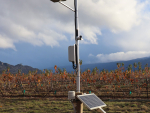Zespri says the TPP could save over $1000 for every hectare of kiwifruit grown in New Zealand if potential tariff relief was passed on to growers.
Zespri is joined by Horticulture NZ and a range of other primary producer bodies in welcoming the agreement, signed in Auckland today, amid protest.
Zespri chief executive Lain Jager explains the TPP will eliminate tariffs on kiwifruit exports into all 12 Asia-Pacific nations when it comes into force, with the biggest impact to be seen in Japan.
In 2014, the industry paid over $15 million in tariffs into Japan which is Zespri's largest country market.
"Kiwifruit growers would save over $1000 for every hectare of kiwifruit grown in New Zealand, if this tariff relief was passed straight through to New Zealand growers. This tariff elimination will also benefit Japanese consumers by supporting our competitiveness against other fruit in Japan," says Jager.
Annual sales volumes to Japan are expected to increase about 10% over the next five years.
The other countries in the agreement – Brunei, Chile, Singapore, USA, Australia, Peru, Vietnam, Malaysia, Mexico, Canada – either do not have tariffs on kiwifruit, have existing free trade agreements with NZ or do not currently import NZ kiwifruit.
"This is an excellent result for our industry, which is set to earn nearly $2 billion in sales revenue this season and growing strongly. The reality is that New Zealand is a small nation reliant on exporting to earn our way in the world and these agreements are vital to our future prosperity."
Horticulture New Zealand says the estimated saving for nine key product lines (kiwifruit, apples, avocado, buttercup squash, capsicum, cherries, onions, potatoes and vegetable juices) is just over $25 million a year for the growers now exporting these products to Japan, the USA and Vietnam.
The most critical result in the deal for New Zealand horticulture exporters is the reduction of tariffs to Japan. Japan is New Zealand horticulture's third largest market.
"The reduction and eventual removal of these tariffs doesn't just mean savings for growers exporting now, but it means the products they export in the future will be more competitively priced and able to challenge the offerings from other countries," HortNZ chief executive Mike Chapman says.
"Market access is an issue that never goes away for horticulture. So an agreement like this is overwhelmingly welcomed by growers, who can now be more confident about the markets they supply and can continue to plan for growth in their businesses."



















